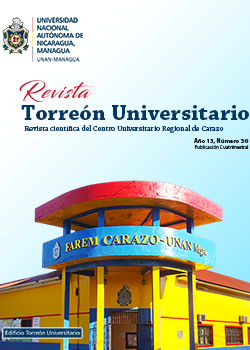Inclusive education for non-hearing students from the Miguel de Cervantes Institute, Managua
DOI:
https://doi.org/10.5377/rtu.v13i38.19120Keywords:
Education, inclusive, society, knowledge, paradigmAbstract
The main objective of this research is to identify the main achievements, challenges and challenges of inclusive education for non-hearing people at the Miguel de Cervantes Institute, Managua. Thus becoming known as one of the pioneers at the municipal level in inclusive education, it is an achievement for the institute to be able to work and participate in the education of the non-hearing population.
The research is situated in a mixed approach precisely because it consists of a set of systematic, empirical and critical research processes that involve the collection and analysis of quantitative and qualitative data. Interviews were conducted with students, as well as with inclusive education teachers. The unit of analysis of this research is constituted by a non-probabilistic sample, intentionally or by convenience, made up of secondary education students from the Miguel de Cervantes Saavedra Institute.
Something important that can be emphasized is that these students are immersed in a classroom as an active student and included with their peers and society.
Downloads
References
Arias, F. (2012). El proyecto de Investigación. Introducción a la metodología científica. (6ta ed.). Caracas: Episteme.
Alisedo, G (2006) El aprendizaje de la lengua escrita por el alumno sordo. Ministerio de Educación
Delval (1991). Función social de la Educación.
Hernández, Fernández y Baptista (2014), Metodología de la Investigación científica, sexta edición.
UNESCO (1995). La lengua de señas.
UNESCO. (2008). Conferencia Internacional de Educación la educación inclusiva: el camino hacia el futuro. Recuperado de: www.ibe. Unesco .org/.../user.../ Confinted_48 3_Spanish.pdf
Downloads
Published
Issue
Section
License
Copyright (c) 2024 National Autonomous University of Nicaragua, Managua

This work is licensed under a Creative Commons Attribution-NonCommercial-NoDerivatives 4.0 International License.
The authors who publish in this journal agree to the following terms.
- The author or authors of the articles, essays or research grant the National Autonomous University of Nicaragua, Managua (UNAN-Managua) the editing rights (copyright) of the submitted work, therefore the University has the exclusive right to publish the article for the entire copyright period.
- These copyrights/authors authorize Torreón Universitario Magazine and the University to edit and disseminate/publish the article in said Magazine, including printed and electronic reproduction, storage, retrieval and any other type of publication, and sources of secondary information as services. of summaries and databases, they also empower it to protect the article against unauthorized use for dissemination by printed or electronic media (PDF, HTML, EPUB, XML or others).
License for use of content
The magazine uses the Creative Commons Attribution-NonCommercial-NoDerivs 4.0 International License.
Under this statement:

This journal is licensed under a Creative Commons Attribution-NonCommercial-NoDerivatives 4.0 International License. It can be copied, distributed and transmitted publicly as long as the author and source are cited (Revista Torreón Universitario), it should not be modified or used for any commercial purpose. The full license can be found at http://creativecommons.org/licenses/by-nc-nd/4.0/.



